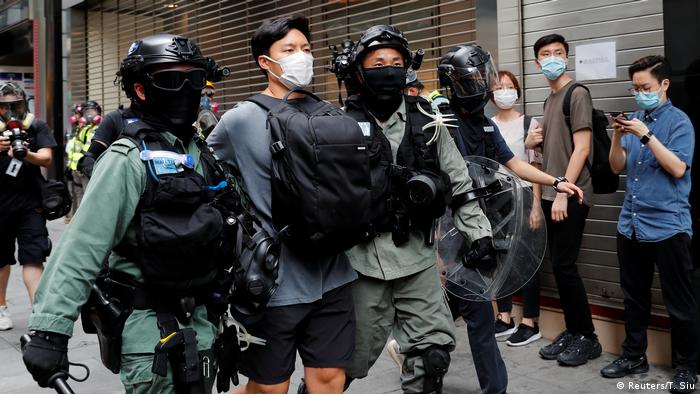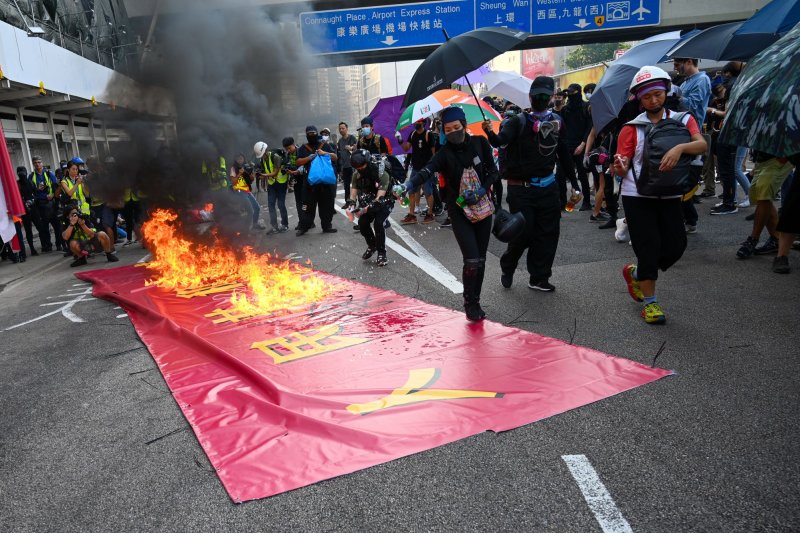Amnesty International alleges that at least 10,000 died while being wrongly held – some of them in a centre part funded by the UK
BOKO HARAM NOT THE ONLY THREAT TO CHILDREN
Global development is supported by About this content
About this content
Emmanuel Akinwotu
Wed 27 May 2020
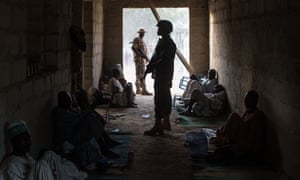
Global development is supported by
 About this content
About this contentEmmanuel Akinwotu
Wed 27 May 2020

Nigerian soldiers guarding civilians who had fled the fighting in Bama in 2015. The country’s military had retaken the northeastern town from Boko Haram, but about 7,500 people were displaced by the fighting. Photograph: Nichole Sobecki/AFP
Widespread unlawful detention and torture by Nigerian security forces has aggravated the suffering of a generation of children and tens of thousands of people in north-east Nigeria, according to a new report.
At least 10,000 victims – many of them children – have died in military detention, among the many thousands more arrested during a decade-long conflict with jihadist groups, according to Amnesty International.
Many left their homes to flee violence from Boko Haram, whose deadly jihadist insurgency began in 2009. Yet displaced people were wrongly arrested by civilian militia forces and soldiers on suspicion of being connected to or supporting the insurgency, the report said.
In allegations strongly denied by the Nigerian army, victims suffered torture and years of detention without charge, trial or medical treatment, in “inhumane” conditions at three centres. One is the Giwa barracks detention centre where rights groups have for years reported endemic human rights abuses.
Another of the centres hosts a reintegration programme for alleged jihadists and their supporters, funded by the UK government and international donors, where conditions were not as severe but abuses were widespread, the report said.
Joanne Mariner, the acting director of crisis response at Amnesty International, called for authorities to investigate the “appalling” treatment of victims.
“From mass, unlawful detention in inhumane conditions, to meting out beatings and torture and allowing sexual abuse by adult inmates – it defies belief that children anywhere would be so grievously harmed by the very authorities charged with their protection,” she said.
“The past decade of bitter conflict between Nigeria’s military and Boko Haram has been an assault on childhood itself in north-east Nigeria,” Mariner added. “Boko Haram has repeatedly attacked schools and abducted large numbers of children as soldiers or ‘wives’, among other atrocities.”
Among the 230 people Amnesty interviewed was 10-year-old Ibrahim, who said his family had fled their village after an attack by Boko Haram when he was five and were arrested several days later by the military.
“We said we escaped from Boko Haram, but the military did not believe us,” he said. “They said that we were part of Boko Haram. They hit us children with a rope of animal skin and slapped our parents with the flat end of a long knife. They beat us every day.”
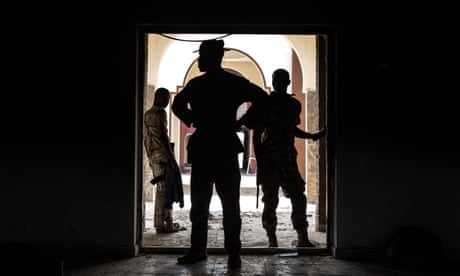
Nigeria detained children as young as five over 'Boko Haram links' – report
https://www.theguardian.com/global-development/2019/sep/11/nigeria-children-as-young-as-five-boko-haram-links-report
Another 14-year-old boy was also arrested after fleeing abduction by Boko Haram, and then detained at Giwa barracks: “The conditions in Giwa are horrible. They could make you die. There’s no place to lie down,” he said. “Up to now, nobody has told me why I was taken there, what I did, why I was in detention.”
Col Sagir Musa, the director of public relations for the Nigerian army, dismissed Amnesty’s report as “mere claims”.
“There is no basis for the accusation. The Nigerian army has strongly debunked such malicious claims and no group has convincingly refuted our position,” he said.
The findings add to a litany of abuse allegations that have dogged Nigerian security forces, intensifying during its war with Boko Haram and a jihadist offshoot, the Islamic State West African Province.
More than 36,000 people have died and almost two million are displaced within north-east Nigeria, in one of the world’s worst humanitarian crises.
Operation Safe Corridor, an army-run deradicalisation programme of mostly men and boys, which receives funding from the UK, has released thousands of jihadi suspects. Fourteen hundred Boko Haram suspects were released earlier this year.
Former detainees were positive about conditions at the Safe Corridor site yet said a number of human rights violations frequently occurred there.
Detainees were made to produce items such as shoes and soaps in training programmes which amounted to forced labour, Amnesty said. Some detainees suffered serious injuries working with caustic soda without protective equipment. At least seven detainees at the site died.
Kate Allen, the director of Amnesty International, said: “The UK’s support of a military-run detention centre that is unlawfully imprisoning people, including children, and subjecting them to unsafe conditions is particularly worrying.
“The UK government must work with the Nigerian authorities to ensure that the military is protecting the population, and that absolutely no UK support is contributing to the vile abuses taking place in the context of the conflict.”
The children left behind in West Africa's conflict-torn regions
Human rights groups say children in conflict regions aren't receiving enough support. Children who have escaped from Boko Haram are treated with suspicion in Nigeria, while schools are closing in Burkina Faso.
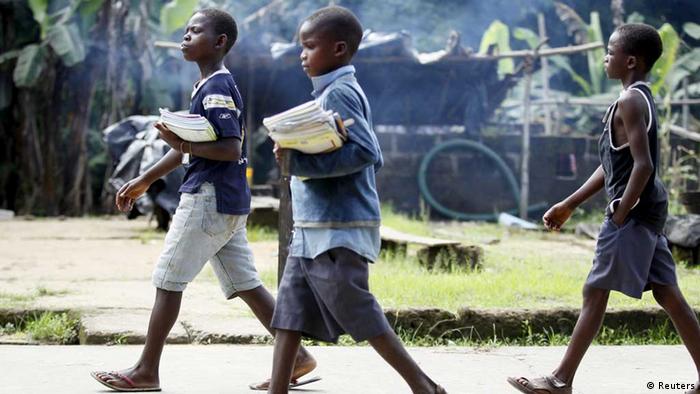
A generation of children in West Africa risk missing out on vital education and health care amid ongoing conflicts in the region, human rights organizations warn.
A new report released by Amnesty International on Wednesday detailed failure on the part of Nigerian authorities to protect and provide education to children in the country's northeast, which has been devastated by more than a decade of conflict between the Nigerian government and the Boko Haram armed insurgency.
Another report released by Human Rights Watch on Tuesday found an increase in Islamist extremist attacks in Burkina Faso since 2017 has had a horrific impact on children's education. Armed groups aligned with al-Qaida and the so-called Islamic State have repeatedly attacked teachers and schools in the country in opposition to Western-style education and government institutions, the report said.
Similarly, extremist-driven violence is rife in Mali and Niger, where schools are also being forced to close, leaving children without access to support and making them more vulnerable to recruitment by extremist groups.

A Nigerian soldier with women and girls rescued from Boko Haram in 2015
Boko Haram ravages northeastern Nigeria
Amnesty International's report, entitled 'We dried out tears': Addressing the toll on children of Northeast Nigeria's conflict, accuses Nigeria's military of unlawfully detaining children who escaped from the armed extremist group.
"The past decade of bitter conflict between Nigeria's military and Boko Haram has been an assault on childhood itself in Northeast Nigeria," said Joanne Mariner, Amnesty International's Acting Director of Crisis Response, in a press release.
"The Nigerian military's treatment of those who escape such brutality has also been appalling."
The Nigerian military has been repeatedly accused by diverse rights groups of holding thousands of children in squalid conditions for years. In Amnesty's latest report, interviewees described being held in inhumane conditions while being subject to beatings, torture and sexual abuse by adult inmates. The vast majority of the children are never charged with a crime.
Nigerian authorities have consistently denied any allegations of mistreatment.
"The state government has been on top of the situation in ensuring that the [Boko Harm] insurgency does not destroy the dreams and aspirations of [these] children by providing adequate educational facilities, vocational training centers and free education centers to give them equal opportunities," Hajiya Zuwaira Gambo, the Borno State Commissioner of Women Affairs and Social Development, told DW.
Read more: Boko Haram – Nigeria moves to deradicalize former fighters

The training sketch drawn on a wall for new recruits to Boko Haram
An unwelcome return
Despite the trauma they have faced, many children who have escaped or been rescued from Boko Haram are treated with suspicion, with some classified as 'combatants' and transferred to military detention facilities, according to the report.
Former child soldier, 12-year-old Idris Muhammad, told DW how he and other boys were trained for potential combat by the extremist group.
"We were abducted form our village and they took us to their base in Sambisa Forest," he said. "Whenever they went to the battle field they normally carried us along. They taught us what they did on the battleground and they even killed people in front of us."
While the majority of girls are kidnapped to be used as brides for the fighters, 13-year-old Maryam Umar Kirawa says she and other girls were still trained to fight if necessary.
"They taught us how to kill a person with a knife, or a gun with bullets," she told DW. "They also taught us their own type of religion. In fact, they told us they were going to teach us all the methods of war before we escaped."
More support needed
Zariyatu Abubakar, a children's rights activist in northeastern Nigeria, says returnee children should be given more protection and support by authorities.
"They are only children, so somebody has to take responsibility to support them, educate them, feed them and provide shelter for them," she told DW. "We need to place these children into homes to that they will feel secure and protected."
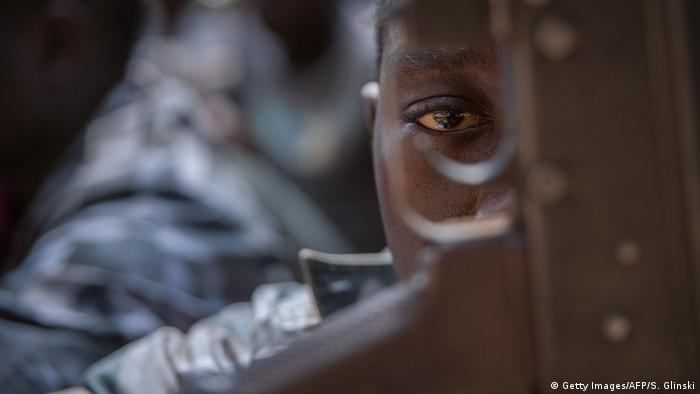
Children abducted by extremist groups require support and education to recover from a traumatic past
UNICEF official Geoffrey Ijumba says the children need to be viewed first-and-foremost as victims if they are to be properly rehabilitated.
"We need to make sure they are integrated [back into society] because this is the only way they will rediscover their dreams and be able to contribute positively to their own personal development and to the development of [Nigeria]," he told DW.
Education suffers in Burkina Faso
Meanwhile, Human Rights Watch finds attacks by armed extremists on schools are on the rise in Burkina Faso, severely damaging children's long-term access to education.
Since the emergence of the Burkinabe Islamist group, Ansar ul Islam in 2016, violence has steadily increased, primarily in the country's northern and eastern regions, according to report by the organization entitled 'Their War Against Education': Armed Group Attacks on Teachers, Students, and Schools in Burkina Faso.
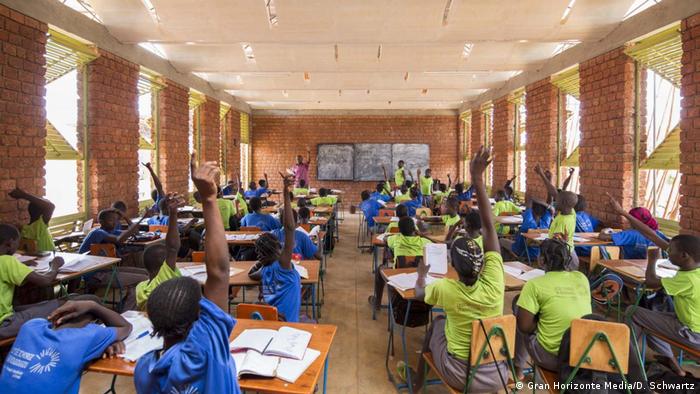
Many children in Burkina Faso are missing out on an education due to extremist violence
A surge in attacks in 2019 forced more than 830,000 people from their homes.
The extremist groups have abducted and killed education professionals, including teachers, and damaged or destroyed existing schools, the report says.
"Armed Islamist groups targeting teachers, students and schools in Burkina Faso are not only committing war crimes, but are undoing years of progress in improving children's access to education," said HRW's children's rights researcher, Lauren Seibert, in a press release.
"The Burkinabe government should investigate these attacks, ensure children regain access to schooling and provide needed support to education workers who experienced attacks."
Watch video02:57
Thousands flee violence in Burkina Faso
While some positive steps have been taken, such as reopening some schools and expanding distance-learning programs alongside its COVID-19 response, observers say the traumatic impact of the attacks will be compounded if the conflict continues.
"Armed Islamist groups have cost teachers their lives, livelihoods and physical and mental health, and they are costing hundreds of thousands of children their futures," said Seibert. "These attacks need to stop."
Children without access to education or social services are also at higher risk of being recruited by extremist groups, perpetuating the cycle even further.
Children also affected in Mali and Niger
Ongoing attacks by Islamist extremists in the Sahel region have also spilled over into Mali and Niger. UNICIEF says over 8 million children have been forced out of school.
Almost 3,000 schools were forced to close in the region between April 2017 and December 2010, including 1,261 in Mali and 354 in Niger.
Once considered a buffer zone against violence in neighboring Nigeria and Libya, the tri-border region, which includes Burkina Faso, has devolved into a hotbed of conflict, despite international military support.
According to UNICEF, the crisis in the Lake Chad region has forced over 3 million people to flee their homes.
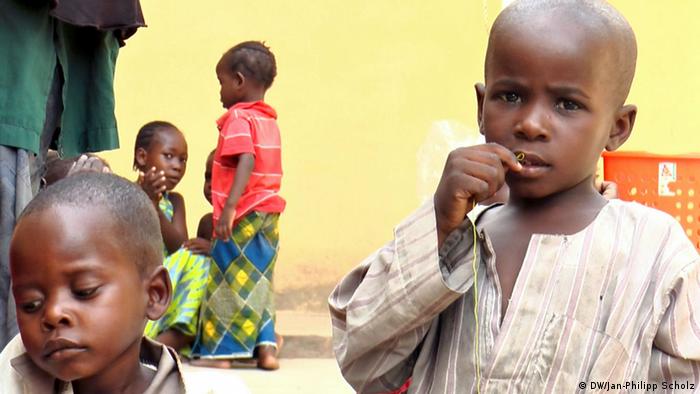
FREED BOKO HARAM HOSTAGES: 'THE PAIN IS STILL THERE'
Traumatic experiences
"You notice one thing straightaway - the children here hardly ever laugh," says a helper at Malkohi camp, close to the Nigerian city of Yola. The camp now accommodates almost 300 people who were liberated in early May from Boko Haram captivity. About half are under 18 years old. Every third child is malnourished.
MORE PICTURES 12345678
Mohammad Al-Amin contributed to this article.
Date 27.05.2020
Author Ineke Mules
Related Subjects The United Nations Children's Fund (UNICEF), Human Rights, Boko Haram, Niger, Nigeria, Amnesty International
Keywords Africa, Nigeria, Burkina Faso, Mali, Niger, West Africa, Boko Haram, Islamic extremists, child soldiers, Borno State, Amnesty International, Human Rights Watch (HRW), UNICEF, human rights
Permalink https://p.dw.com/p/3coTc
Widespread unlawful detention and torture by Nigerian security forces has aggravated the suffering of a generation of children and tens of thousands of people in north-east Nigeria, according to a new report.
At least 10,000 victims – many of them children – have died in military detention, among the many thousands more arrested during a decade-long conflict with jihadist groups, according to Amnesty International.
Many left their homes to flee violence from Boko Haram, whose deadly jihadist insurgency began in 2009. Yet displaced people were wrongly arrested by civilian militia forces and soldiers on suspicion of being connected to or supporting the insurgency, the report said.
In allegations strongly denied by the Nigerian army, victims suffered torture and years of detention without charge, trial or medical treatment, in “inhumane” conditions at three centres. One is the Giwa barracks detention centre where rights groups have for years reported endemic human rights abuses.
Another of the centres hosts a reintegration programme for alleged jihadists and their supporters, funded by the UK government and international donors, where conditions were not as severe but abuses were widespread, the report said.
Joanne Mariner, the acting director of crisis response at Amnesty International, called for authorities to investigate the “appalling” treatment of victims.
“From mass, unlawful detention in inhumane conditions, to meting out beatings and torture and allowing sexual abuse by adult inmates – it defies belief that children anywhere would be so grievously harmed by the very authorities charged with their protection,” she said.
“The past decade of bitter conflict between Nigeria’s military and Boko Haram has been an assault on childhood itself in north-east Nigeria,” Mariner added. “Boko Haram has repeatedly attacked schools and abducted large numbers of children as soldiers or ‘wives’, among other atrocities.”
Among the 230 people Amnesty interviewed was 10-year-old Ibrahim, who said his family had fled their village after an attack by Boko Haram when he was five and were arrested several days later by the military.
“We said we escaped from Boko Haram, but the military did not believe us,” he said. “They said that we were part of Boko Haram. They hit us children with a rope of animal skin and slapped our parents with the flat end of a long knife. They beat us every day.”

Nigeria detained children as young as five over 'Boko Haram links' – report
https://www.theguardian.com/global-development/2019/sep/11/nigeria-children-as-young-as-five-boko-haram-links-report
Another 14-year-old boy was also arrested after fleeing abduction by Boko Haram, and then detained at Giwa barracks: “The conditions in Giwa are horrible. They could make you die. There’s no place to lie down,” he said. “Up to now, nobody has told me why I was taken there, what I did, why I was in detention.”
Col Sagir Musa, the director of public relations for the Nigerian army, dismissed Amnesty’s report as “mere claims”.
“There is no basis for the accusation. The Nigerian army has strongly debunked such malicious claims and no group has convincingly refuted our position,” he said.
The findings add to a litany of abuse allegations that have dogged Nigerian security forces, intensifying during its war with Boko Haram and a jihadist offshoot, the Islamic State West African Province.
More than 36,000 people have died and almost two million are displaced within north-east Nigeria, in one of the world’s worst humanitarian crises.
Operation Safe Corridor, an army-run deradicalisation programme of mostly men and boys, which receives funding from the UK, has released thousands of jihadi suspects. Fourteen hundred Boko Haram suspects were released earlier this year.
Former detainees were positive about conditions at the Safe Corridor site yet said a number of human rights violations frequently occurred there.
Detainees were made to produce items such as shoes and soaps in training programmes which amounted to forced labour, Amnesty said. Some detainees suffered serious injuries working with caustic soda without protective equipment. At least seven detainees at the site died.
Kate Allen, the director of Amnesty International, said: “The UK’s support of a military-run detention centre that is unlawfully imprisoning people, including children, and subjecting them to unsafe conditions is particularly worrying.
“The UK government must work with the Nigerian authorities to ensure that the military is protecting the population, and that absolutely no UK support is contributing to the vile abuses taking place in the context of the conflict.”
The children left behind in West Africa's conflict-torn regions
Human rights groups say children in conflict regions aren't receiving enough support. Children who have escaped from Boko Haram are treated with suspicion in Nigeria, while schools are closing in Burkina Faso.

A generation of children in West Africa risk missing out on vital education and health care amid ongoing conflicts in the region, human rights organizations warn.
A new report released by Amnesty International on Wednesday detailed failure on the part of Nigerian authorities to protect and provide education to children in the country's northeast, which has been devastated by more than a decade of conflict between the Nigerian government and the Boko Haram armed insurgency.
Another report released by Human Rights Watch on Tuesday found an increase in Islamist extremist attacks in Burkina Faso since 2017 has had a horrific impact on children's education. Armed groups aligned with al-Qaida and the so-called Islamic State have repeatedly attacked teachers and schools in the country in opposition to Western-style education and government institutions, the report said.
Similarly, extremist-driven violence is rife in Mali and Niger, where schools are also being forced to close, leaving children without access to support and making them more vulnerable to recruitment by extremist groups.

A Nigerian soldier with women and girls rescued from Boko Haram in 2015
Boko Haram ravages northeastern Nigeria
Amnesty International's report, entitled 'We dried out tears': Addressing the toll on children of Northeast Nigeria's conflict, accuses Nigeria's military of unlawfully detaining children who escaped from the armed extremist group.
"The past decade of bitter conflict between Nigeria's military and Boko Haram has been an assault on childhood itself in Northeast Nigeria," said Joanne Mariner, Amnesty International's Acting Director of Crisis Response, in a press release.
"The Nigerian military's treatment of those who escape such brutality has also been appalling."
The Nigerian military has been repeatedly accused by diverse rights groups of holding thousands of children in squalid conditions for years. In Amnesty's latest report, interviewees described being held in inhumane conditions while being subject to beatings, torture and sexual abuse by adult inmates. The vast majority of the children are never charged with a crime.
Nigerian authorities have consistently denied any allegations of mistreatment.
"The state government has been on top of the situation in ensuring that the [Boko Harm] insurgency does not destroy the dreams and aspirations of [these] children by providing adequate educational facilities, vocational training centers and free education centers to give them equal opportunities," Hajiya Zuwaira Gambo, the Borno State Commissioner of Women Affairs and Social Development, told DW.
Read more: Boko Haram – Nigeria moves to deradicalize former fighters

The training sketch drawn on a wall for new recruits to Boko Haram
An unwelcome return
Despite the trauma they have faced, many children who have escaped or been rescued from Boko Haram are treated with suspicion, with some classified as 'combatants' and transferred to military detention facilities, according to the report.
Former child soldier, 12-year-old Idris Muhammad, told DW how he and other boys were trained for potential combat by the extremist group.
"We were abducted form our village and they took us to their base in Sambisa Forest," he said. "Whenever they went to the battle field they normally carried us along. They taught us what they did on the battleground and they even killed people in front of us."
While the majority of girls are kidnapped to be used as brides for the fighters, 13-year-old Maryam Umar Kirawa says she and other girls were still trained to fight if necessary.
"They taught us how to kill a person with a knife, or a gun with bullets," she told DW. "They also taught us their own type of religion. In fact, they told us they were going to teach us all the methods of war before we escaped."
More support needed
Zariyatu Abubakar, a children's rights activist in northeastern Nigeria, says returnee children should be given more protection and support by authorities.
"They are only children, so somebody has to take responsibility to support them, educate them, feed them and provide shelter for them," she told DW. "We need to place these children into homes to that they will feel secure and protected."

Children abducted by extremist groups require support and education to recover from a traumatic past
UNICEF official Geoffrey Ijumba says the children need to be viewed first-and-foremost as victims if they are to be properly rehabilitated.
"We need to make sure they are integrated [back into society] because this is the only way they will rediscover their dreams and be able to contribute positively to their own personal development and to the development of [Nigeria]," he told DW.
Education suffers in Burkina Faso
Meanwhile, Human Rights Watch finds attacks by armed extremists on schools are on the rise in Burkina Faso, severely damaging children's long-term access to education.
Since the emergence of the Burkinabe Islamist group, Ansar ul Islam in 2016, violence has steadily increased, primarily in the country's northern and eastern regions, according to report by the organization entitled 'Their War Against Education': Armed Group Attacks on Teachers, Students, and Schools in Burkina Faso.

Many children in Burkina Faso are missing out on an education due to extremist violence
A surge in attacks in 2019 forced more than 830,000 people from their homes.
The extremist groups have abducted and killed education professionals, including teachers, and damaged or destroyed existing schools, the report says.
"Armed Islamist groups targeting teachers, students and schools in Burkina Faso are not only committing war crimes, but are undoing years of progress in improving children's access to education," said HRW's children's rights researcher, Lauren Seibert, in a press release.
"The Burkinabe government should investigate these attacks, ensure children regain access to schooling and provide needed support to education workers who experienced attacks."
Watch video02:57
Thousands flee violence in Burkina Faso
While some positive steps have been taken, such as reopening some schools and expanding distance-learning programs alongside its COVID-19 response, observers say the traumatic impact of the attacks will be compounded if the conflict continues.
"Armed Islamist groups have cost teachers their lives, livelihoods and physical and mental health, and they are costing hundreds of thousands of children their futures," said Seibert. "These attacks need to stop."
Children without access to education or social services are also at higher risk of being recruited by extremist groups, perpetuating the cycle even further.
Children also affected in Mali and Niger
Ongoing attacks by Islamist extremists in the Sahel region have also spilled over into Mali and Niger. UNICIEF says over 8 million children have been forced out of school.
Almost 3,000 schools were forced to close in the region between April 2017 and December 2010, including 1,261 in Mali and 354 in Niger.
Once considered a buffer zone against violence in neighboring Nigeria and Libya, the tri-border region, which includes Burkina Faso, has devolved into a hotbed of conflict, despite international military support.
According to UNICEF, the crisis in the Lake Chad region has forced over 3 million people to flee their homes.

FREED BOKO HARAM HOSTAGES: 'THE PAIN IS STILL THERE'
Traumatic experiences
"You notice one thing straightaway - the children here hardly ever laugh," says a helper at Malkohi camp, close to the Nigerian city of Yola. The camp now accommodates almost 300 people who were liberated in early May from Boko Haram captivity. About half are under 18 years old. Every third child is malnourished.
MORE PICTURES 12345678
Mohammad Al-Amin contributed to this article.
Date 27.05.2020
Author Ineke Mules
Related Subjects The United Nations Children's Fund (UNICEF), Human Rights, Boko Haram, Niger, Nigeria, Amnesty International
Keywords Africa, Nigeria, Burkina Faso, Mali, Niger, West Africa, Boko Haram, Islamic extremists, child soldiers, Borno State, Amnesty International, Human Rights Watch (HRW), UNICEF, human rights
Permalink https://p.dw.com/p/3coTc




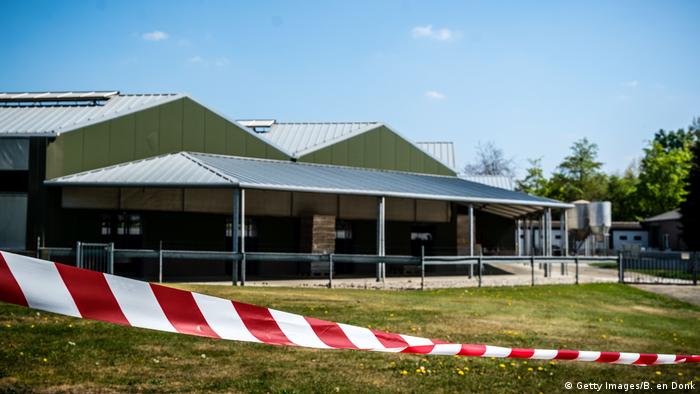
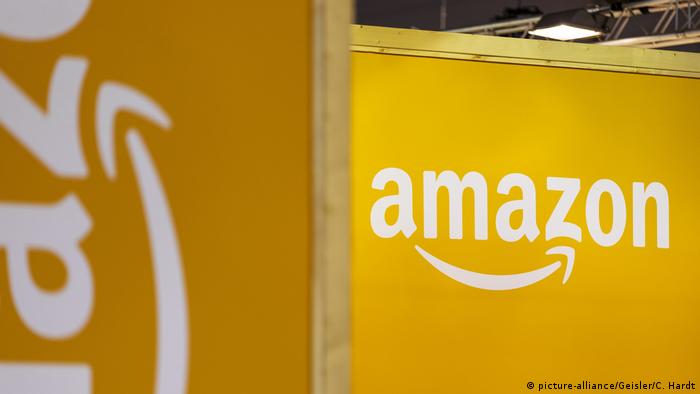
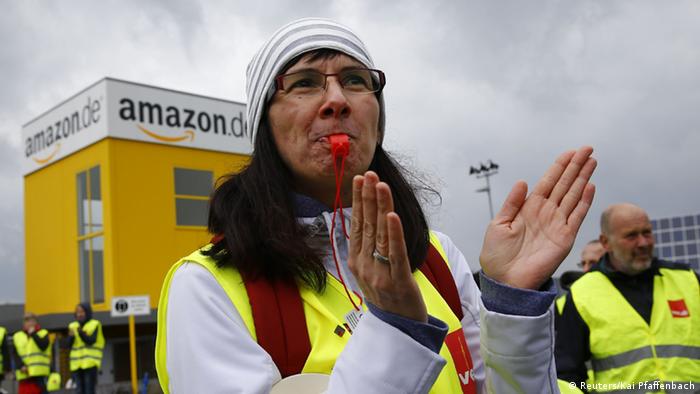
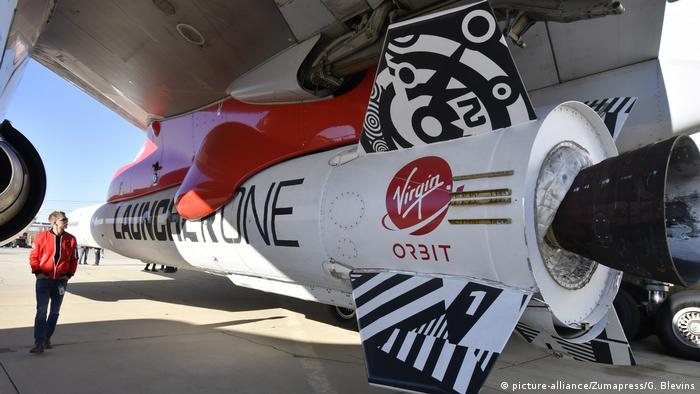
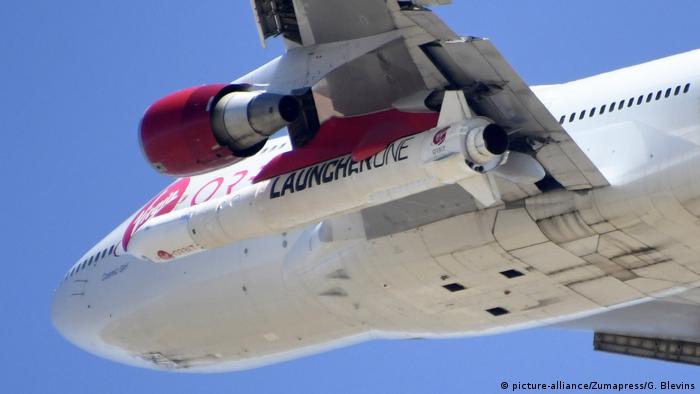
/cdn.vox-cdn.com/uploads/chorus_image/image/66839848/Virgin_Orbit_88__3_.0.jpg)
